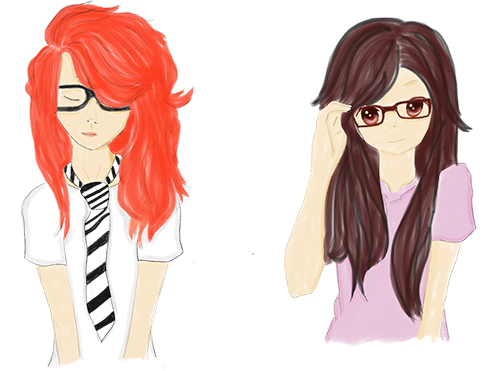Alex and Elaine both attended three years of SPICE camp. Both had enviable masses of shiny hair, braces, and rocked awesome nerd glasses. Both were straight A students who participated in TAG and after school academics. Both loved science and intended to pursue careers in STEM. Elaine would smile wide any time she was asked about doing science. She would describe projects she’d done, teachers who encouraged here, and weekend science parties with friends. Alex also enjoyed talking about doing science, documentaries she’d watched, books she enjoyed, and her science fair project. But underneath the enthusiasm was a barely hidden frustration. What was going on to make these girls experiences and expressions different? Was it just their personalities, or was something more going on?
Elaine is soft spoken and a little shy, but she lights up when talking about science. When asked if she’s ever felt discourage in science she talks about how she knows there’s a fair amount of sexism around science, but she’s never experienced it herself. She describes teachers who encourage her to experiment and support her interests through extra projects and after school clubs. She also talks about her friends. Elaine has a group of friends who all love science. They get together to have disassembly parties where they take apart mechanical toys to try and figure out how the insides work. They test out chemical reactions. They share science fiction books and TV shows they like. They work on school projects together. Their parents take turns hosting the girls activities on weekends and after school. Elaine has an ecosystem of science supporters and she couldn’t be happier with her science experiences.
Alex is outspoken, organized, and definite about what she likes and doesn’t like. Everywhere she goes, she has a book, wrapped in a quilted cover. She loves to read and she loves science. Alex is a science ninja. She’s better than good at science and she knows it. She also knows that her peers don’t necessarily see it that way. You see, Alex had an arch nemesis, sort of. Alan, was also very good at science. Alex and Alan were always neck and neck . . . sort of. The thing was, Alex was actually the better all around at math and science student. She asked more questions, did extra credit projects for fun, and completed generally better quality assignments. But Alan did well on standardized tests, some times, and more importantly, when the question of who the best science students were came up, Alan’s name was always the first out of people’s mouths. Alex was hardly mentioned at all. Alex didn’t actually see Alanas her arch nemesis. It was the idea of Alan that plagued her. The idea that her peers did not see the two of them in same light, despite her many accomplishments. This frustrated Alex to no end.
When her school decided to hold a robotics afterschool club, students were invited based on TAG status, but anyone could actually attend. So Alex cajoled a friend who was smart, but not TAG identified, into going with her. They showed up for the first meeting, walked in the door, saw they were the only girls and looked at each other. Nope. They didn’t go back. “I looked in that room full of boys and thought, ‘Great, thisagain.’”
Alex had two really close friends. They read books together, had frequent sleepovers, and shared a lot of interests, except science. Sometimes, her friends would humor her and talk about science fiction she liked or go to the science museum with her. But Alex had learned to ration these episodes. She knew there was a limit to how much her friends wanted to indulge her science interests and she didn’t want to push the bounds of friendship too far.
Alex’s frustration with her peers was two-fold. First, she wasn’t getting the recognition she deserved based on her accomplishments. Second, she didn’t have any female peers to share her love of science with. Like Elaine, Alex has supportive parents and teachers who encourage her interest in science, but her ecosystem is weak. It’s missing a cornerstone element, peers who share her interest and recognize her accomplishments.
When I interviewed them in 2014, Alex and Elaine both enacted signals of a science identity that I call the “expert” girl scientist. Expert-type girls view science as a realm of rigorous study and a mastery. For these girls scientists are people who work very hard the become, well, experts. A major component to being an expert, is being recognized for one’s expertise. Research shows, that in general, girls and women receive less recognition for their scientific accomplishments and in Alex’s case, it’s showing. She has noticed the disparity and it’s frustrating the heck out of her.
Alex and Elaine are in high school and thriving, but it remains to be seen if science is in their futures. Both are highly motivated learners. They also have lots of options. If Alex doesn’t find peers who share her interest and receive the recognition her accomplishments deserve, there are plenty of other areas of study she can pursue where she will find those missing elements.
Time will tell.


